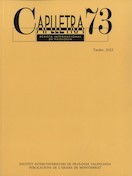Autobiographical texts written by learners of Catalan as an Additional Language: From formative needs to reflection in the teaching of narrative genres
DOI:
https://doi.org/10.7203/caplletra.73.24640Palabras clave:
discourse competence, formative needs, Catalan as Additional Language, Self-referential genres, deixis, metadiscursive reflection Resumen
Resumen
In this article we analyse autobiographical narrative texts written by university students studying Catalan as an Additional Language at a CEFR (2020) B1 level. The goal is to analyse the formative needs related to the writing of this genre in order to foster metadiscursive reflection in the classroom that will allow students to improve their written output. To this end, we analyzed a corpus of 39 autobiographies at both the macrotextual level (i.e., rhetorical moves) and the microtextual level (i.e., deictic elements which channel the narrative’s organization). Our results show that the problems that these texts present for students are related to awareness of the elements that define the genre (i.e., the sociocultural dimension) as well as the text’s narrative-temporal anchoring and the narrator’s deictic positioning (i.e., the pragmatic and textual dimensions). Thus, we propose a kind of competence-oriented teaching of genres in which the discursive and grammatical features that have a bearing on a text’s discursive coherence and cohesion are integrated at the same level.
 Descargas
Descargas
Descargas
Publicado
Cómo citar
-
Resumen369
-
PDF 501
Número
Sección
Licencia
El autor o autora que dirija un trabajo a la redacción de Caplletra para ser publicado tiene que ser la persona titular legítima de los derechos de explotación. La legitimación para la publicación del trabajo tiene que incluir también las imágenes, las tablas, los gráficos y otros materiales que puedan complementar el texto, con independencia de si es su autor o autora.
Copyright. Al publicar el trabajo en la revista, el autor o autora cede a Caplletra. Revista Internacional de Filologia los derechos de explotación (reproducción, distribución y comunicación pública), tanto para la edición impresa en papel como para la versión electrónica.
Todos los trabajos publicados en Caplletra se encuentran bajo una licencia Creative Commons del tipo Reconocimiento-NoComercial-SinObraDerivada 4.0.
RESPONSABILIDAD
Caplletra. Revista Internacional de Filologia no se identifica necesariamente con los puntos de vista sostenidos en los trabajos que publica.Caplletra. Revista Internacional de Filologia declina toda responsabilidad derivada de cualquier vulneración eventual de los derechos de propiedad intelectual que pudiera ser llevada a cabo por los autores o autoras.






